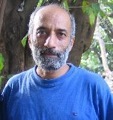Speakers
CFMW08
Electric field induced phenomena in micro-flows: Mixing, particle manipulation and self-assembly (Click here for abstract)
Dr Nadine Aubry is Professor and Head of the Department of Mechanical Engineering at Carnegie Mellon University where she conducts research in the area of fluid dynamics. She pioneered the modeling of open flow turbulence and other complex flows using advanced decomposition tools and dynamical systems theory. Her current group’s research focuses on microscale flows that she manipulates using electric fields. Particularly, her team has proposed new techniques for effective mixing, droplet generation, the manipulation of particles suspended in liquids and the assembly of micro- and nano-sized neutral particles at fluid-fluid interfaces into two-dimensional arrays (monolayers). Dr Aubry’s awards include the Presidential Young Investigator Award from the National Science Foundation (NSF), and her election as Fellow of the American Physical Society (APS), Fellow of the American Society of Mechanical Engineers (ASME), Fellow of the American Association for the Advancement of Science (AAAS), and Senior Member of the American Institute of Aeronautics and Astronautics (AIAA). She currently serves as Chair of the US National Committee for Theoretical and Applied Mechanics (USNC/TAM).
Single particle motion in colloids: Microrheology and microdiffusivity
Professor John F. Brady received his BS in chemical engineering from the University of Pennsylvania in 1975 and spent the next year at Cambridge University as a Churchill Scholar. He received both an MS and a PhD in chemical engineering from Stanford University, the latter in 1981. Following a postdoctoral year at the Ecole Superiéure de Physique et de Chimie Industrielles, he joined the Chemical Engineering department at MIT. Professor Brady moved to Caltech in 1985. Professor Brady's research interests are in the mechanical and transport properties of two-phase materials, especially complex fluids such as biological liquids, colloid dispersions, suspensions, and porous media. His research takes a multilevel approach and combines elements of statistical and continuum mechanics to understand how macroscopic behavior emerges from microscale physics. He is particularly noted for the invention of the Stokesian Dynamics technique for simulating the behavior of particles dispersed in a viscous fluid under a wide range of conditions. Professor Brady has been recognized for his work by many awards, including a Presidential Young Investigator Award, a Camille and Henry Dreyfus Teacher-Scholar Award, the ASEE Curtis W. McGraw Research Award, and the Corrsin and Batchelor lectureships in fluid mechanics. He is a fellow of the American Physical Society and a member of the National Academy of Engineering.
Hydrodynamic interactions between deformable interfaces (Click here for abstract)
Professor Oliver Jensen is Professor of Applied Mathematics and Head of the School of Mathematical Sciences at the University of Nottingham. He is co-editor of the journal Mathematical Medicine & Biology, associate editor of the Journal of Fluid Mechanics and member of the editorial board of the Proceedings of the Royal Society A. His research involves the application of continuum mechanics and mathematical modelling to topics in physiology and medicine. Professor Jensen’s current research encompasses cell adhesion and motility, soft tissues, hydrodynamics in microscopy, pulmonary airway mechanics, flow in collapsible tubes and its stability to self-excited oscillations, spreading of surfactants on viscous fluids and transport in physiological systems.
Professor Nadine Aubry (Department of Mechanical Engineering, Carnegie Mellon University, USA)
Professor Oliver Jensen (School of Mathematical Sciences, University of Nottingham, UK)
Thin-film instabilities of active suspensions (Click here for abstract)
Professor Sriram Ramaswamy received his BS from the University of Maryland and PhD from the University of Chicago and is currently Professor at the Centre for Condensed Matter Theory in the Department of Physics, Indian Institute of Science, Bangalore. His research interests are in the statistical mechanics and dynamics of soft and biological matter, for example that of sedimentation and electrophoresis, dynamics and rheological chaos in surfactant solutions, ordered non-equilibrium states in agitated monolayers of granular rods and the hydrodynamics of self-driven organisms. Professor Ramaswamy has held a number of visiting positions including that at the Kavli Institute of Theoretical Physics, the Isaac Newton Institute, the Hahn-Meitner Institute Berlin, the Centre de Recherche Paul Pascal, Ecole Superieure de Physique et de Chimie Industrielles Paris, IBM Yorktown and the Institute for Theoretical Physics at the University of California Santa Barbara. He has also received numerous awards such as the JC Bose Fellowship, the GD Birla Prize for Science, the Shanti Swarup Bhatnagar Prize for Physical Sciences, the NASI Young Scientist Millennium Award, the BM Birla Memorial Prize for Physics and the NS Satyamurthy Award and has been elected as a Fellow of the Indian National Science Academy and as an Associate of the Indian Academy of Sciences. Professor Ramaswamy currently sits in the editorial boards of Advances and Physics, the Journal of Statistical Mechanics: Theory and Experiment, and Soft Matter and has previously been member of the editorial boards of Physical Review E, Liquid Crystals, Current Science and Resonance.
Professor Sriram Ramaswamy (Department of Physics, Indian Institute of Science, Bangalore, India)


Elastic instabilities in entry flows: A consequence of upstream stretch or downstream relaxation? (Click here for abstract)
Professor Justin Cooper-White received his PhD at the University of Queensland in 2000. His research interests are in biomaterials processing, tissue engineering, non-Newtonian fluid mechanics, rheology and microfluidics. Specifically, his research group at the Tissue Engineering and Microfluidics (TEAM) Laboratory has projects in all of these areas with a common focus of providing fundamental insight into complex polymer-based structures and systems, with the aim of ultimately tailoring and controlling their interactions with biological systems. These projects are investigating novel methods of manufacturing polymeric scaffolds and methods of surface engineering of these scaffolds for drug delivery and tissue engineering applications, new in vitro modules for mapping cell-surface and cell-scaffold interactions, manufacturing functional microparticles with micro processing plants and complex fluid behaviour in microdevices.
Professor John Brady (Department of Chemical Engineering, California Institute of Technology, USA)
Professor Justin Cooper-White (Australian Institute for Bioengineering & Nanotechnology, University of Queensland, Australia)

What can we learn about nonequilibrium reptation from single molecule experiments and slip-link simulations? (Click here for abstract)
Professor Eric Shaqfeh received his BSE in Chemical Engineering from Princeton University, and, MS and PhD degrees in Chemical Engineering from Stanford University under the advice of Professor Andreas Acrivos. In 1986, he was awarded a NATO Postdoctoral Fellowship for postdoctoral work in the Department of Applied Mathematics and Theoretical Physics at Cambridge University in England. He began his career at Stanford University in 1990 where he currently holds a dual appointment as Professor of Mechanical Engineering and Associate Chair of Chemical Engineering. Professor Shaqfeh has received a number of professional awards including the APS Francois N. Frenkiel Award 1989, the NSF Presidential Young Investigator Award 1990, the David and Lucile Packard Fellowship in Science and Engineering 1991, the Camile and Henry Dreyfus Teacher-Scholar Award 1994, the W.M. Keck Foundation Engineering Teaching Excellence Award 1994, and the 1998 Curtis W. McGraw Award from the American Society of Engineering Education. His professional lectureships include the Thiele Lectureship at Notre Dame in 1999, the Van Ness Lectureship at RPI in 2001, the Merck Distinguished Lectureship at Rutgers in 2003, the Corrsin Lectureship at Johns Hopkins in 2003 and the Katz Lectureship at CCNY in 2004. He was also the Hougen Professor of Chemical Engineering at the University of Wisconsin in 2004. In 2000, Professor Shaqfeh was inducted as a Fellow of the American Physical Society and has served as an Associate Editor of Physics of Fluids since 2006. He has authored or co-authored over 120 publications in areas including non-Newtonian fluid mechanics (especially in the area of elastic instabilities, and turbulent drag reduction), nonequilibrium polymer statistical dynamics (focusing on single molecules studies of DNA), and suspension mechanics (particularly of fiber suspensions and composites).
Professor Eric Shaqfeh (Department of Chemical Engineering, Stanford University, USA)
Professor Gary Leal (Department of Chemical Engineering, University of California, Santa Barbara, USA)
Foam structure and rheology: The shape and feel of random soap froth (Click here for abstract)
Andy received a BS in Chemical Engineering from Carnegie-Mellon University in 1972 and a PhD from Princeton in 1976 under the supervision of Prof. William R. Schowalter. He then joined Sandia National Laboratories in Albuquerque, New Mexico, where he has worked ever since. Andy is currently Past President of the Society of Rheology and serves as the U.S. Delegate to the International Committee on Rheology. He received the Distinguished Service Award of the Society in 2001. His research has focused on foam micromechanics—the rheology of liquid foam, mechanics of solid foam, structure, drainage, and processing. He has also worked in polymer processing, non-Newtonian fluid mechanics, and rheometry (co-developer of the helical screw rheometer).
Professor Andrew Kraynik (Sandia National Laboratories, USA)
Linear and nonlinear rheology of entangled, flexible polymers that are highly branched (Click here for abstract)
Professor Gary Leal is Warren and Katherine Schlinger Professor of Chemical Engineering and Chair of the Department of Chemical Engineering at the University of California, Santa Barbara where he conducts research on the dynamics of complex fluids, such as polymeric liquids, emulsions, foams, polymer blends, and liquid crystalline polymers (LCPs). Much of this is related to the coupling between the influence of flow on the microstructure of these materials, and hence on the macroscopic material properties. Within this broad framework, Professor Leal is working on: coalescence phenomena; the dynamics of thin liquid films and the control of the stability of such films due to additives such as copolymer surfactants, and nano- or micro-particles; the flow behavior of LCPs, including the formation of disclinations; and the dynamics of entangled polymers. Professor Leal is the recipient of the American Physical Society Fluid Dynamics prize, the Society of Rheology Bingham medal and the AIChE Allan Colburn award; he is currently the editor of Physics of Fluids and is the John Simon Guggenheim Foundation Fellow, Fellow of the American Physical Society and a member of the National Academy of Engineering.






